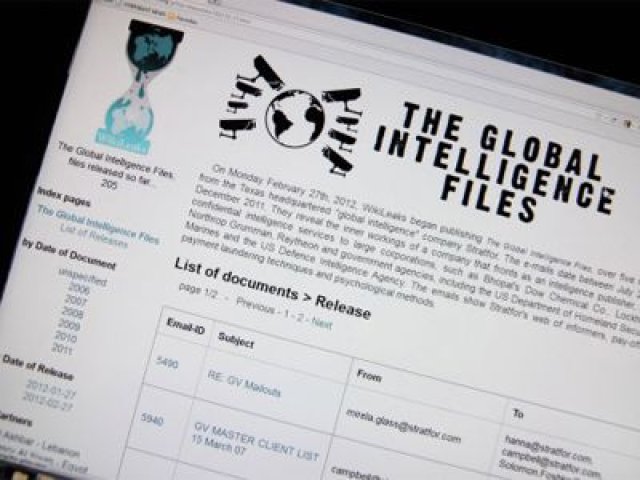
The release of secret emails from private intelligence company Stratfor by WikiLeaks has opened the door on the world of spying-for-profit.
More than 5 million emails between Stratfor employees were stolen by hacker group Anonymous in December last year. The emails were passed on to WikiLeaks, which began releasing them on February 27.
The emails show the inner workings of Stratfor and its connections with the US government and big corporations. Stratfor is revealed to have a group of paid informants in the US government, embassies, media organisations and intelligence networks who provide it with information.
The release also highlights the “revolving door” between government agencies and private security firms. Stratfor's vice-president of intelligence, Fred Burton, is a former official with the US state department, who regularly exploits his links to the US and Israeli governments.
Stratfor was founded in 1996 by right-wing academic George Friedman. It publishes a subscriber-only newsletter offering “geopolitical analysis” that reflects the views of insiders in the intelligence world.
It also carries out intelligence-gathering for private companies such as Coca-Cola, Goldman Sachs and Dow Chemical. It advises US government departments, including the Department of Homeland Security, the Marine Corps and the Defense Intelligence Agency.
The emails have revealed that Stratfor has been paid by several companies, including Coca-Cola and Dow, to monitor political activists campaigning against them.
Since the email release, many commentators have derided Stratfor's publication as uninsightful and the quality of its intelligence gathering as poor.
The Atlantic said on February 27: “Stratfor is just The Economist a week later and several hundred times more expensive." It said Stratfor’s reputation is based more on its marketing than its quality.
The Atlantic and others have attacked WikiLeaks for publishing the emails, saying WikiLeaks was naive for taking Stratfor too seriously. Such criticism serves to downplay the many startling revelations in the emails.
Even if some of the information Stratfor produces is available elsewhere, it does not change the fact that Stratfor's staff also have access to government insiders who share secret information. An example was an email from September 5 last year that showed Friedman was on close terms with Karl Rove, the infamous ex-adviser to former president George W Bush.
In Australia, former National Party Senator Bill O'Chee was revealed to be a major source of information from Australia, the Sydney Morning Herald said on March 1. “He is referenced in more than 2000 Stratfor emails obtained by WikiLeaks,” the SMH said.
Stratfor also receives information from a huge stable of informants in media organisations across the world.
Rolling Stone's Michael Hastings said on February 28 that, unlike other media sources who simply sell stories to public consumers: “Stratfor's mission is to gather information so it can sell it to the highest bidder so corporations can essentially make more profit and get a competitive edge on their opponents.”
The emails also revealed Stratfor was planning to use its information to branch out into a hedge fund called StratCap.
An email by Friedman on September 5 last year said former Goldman Sachs managing director Shea Morenz was in charge of setting up the fund, which would use “Stratfor's intelligence and analysis to trade in a range of geopolitical instruments, particularly government bonds, currency and the like in the world's emerging markets”.
StratCap, set to launch later this year, would legally be independent of Stratfor to protect the company from prosecution for illegal trading.
However, Friedman said: “Do not think of StratCap as an outside organization ... The organizational and legal distinctions are real and important, but StratCap is linked to Stratfor intellectually and contractually.”
The emails also provide an insight into the mindset of those in the intelligence industry. They include many instances of racism, especially towards Middle Eastern people. Burton said in an email on November 14 last year: “I'm offended that we may believe an Iranian before a Jew.”
The emails also contain casual references to the desirability of torturing or ruining the lives of perceived enemies of the US, including WikiLeaks and Anonymous.
Also revealed in the emails for the first time is the news that US authorities have had a secret, sealed indictment prepared for the past 12 months against WikiLeaks founder Julian Assange.
Manipulation of sources is considered commonplace. Friedman told an analyst in an email on December 6 last year: “You have to take control of [the source]. Control means financial, sexual or psychological control.”
Stratfor responded to the leak on February 27 with what Burton, in a leaked email from August 30 last year, called “rule #2”: “Admit nothing, deny everything and make counter-accusations.”
Stratfor's statement said of the leaks: “This is a deplorable, unfortunate — and illegal — breach of privacy.
“Some of the emails may be forged or altered to include inaccuracies; some may be authentic. We will not validate either. Nor will we explain the thinking that went into them.
"Having had our property stolen, we will not be victimized twice by submitting to questioning about them.”
The irony of spies complaining about the exposure of secret information speaks to the fact that Stratfor has no defence of its activities. The exposure also raises the potential for criminal prosecution of Stratfor, something Friedman expressed concern about.
“We are retaining a law firm to create a policy for Stratfor on Foreign Corrupt Practices Act," he wrote in a September 5 email. "I don't plan to do the perp walk and I don't want anyone here doing it either.”
However, Stratfor is only one of many private intelligence firms operating across the world who carry out similar work. WikiLeaks and Anonymous' exposure of Stratfor is just the tip of the corporate spying iceberg.
